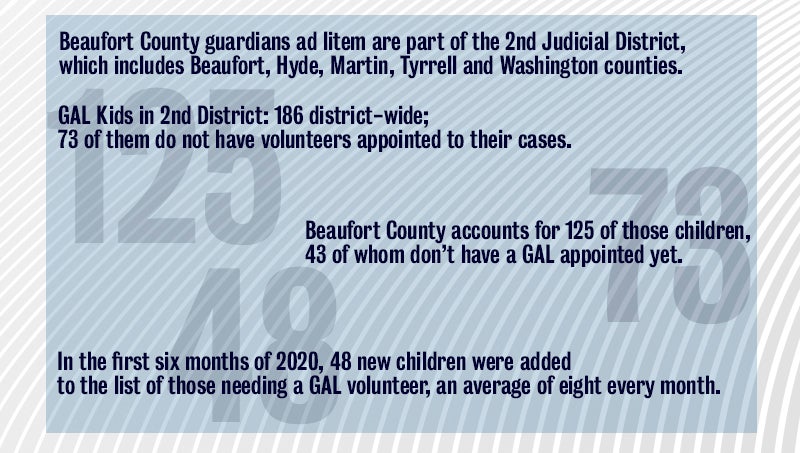Guardians ad litem struggle with COVID limitations
Published 7:59 pm Tuesday, July 7, 2020

- (Daily News)
|
Getting your Trinity Audio player ready...
|
By KAREN THIEL
For the Washington Daily News
Angela Corbin is waiting for the day when she can be face-to-face with the three children she represents as a guardian ad litem volunteer. She is charged with speaking on their behalf as the state courts decide whether to let those children remain with troubled parents or be placed elsewhere until the issues are resolved that put them in danger.
Corbin is one of 26 GAL volunteers currently serving in Beaufort County, which is part of the state’s Second Judicial District. She was assigned two cases shortly after being sworn in as a GAL in March.
“I was supposed to meet two little boys, brothers, from my first case on the Sunday before the COVID-19 stuff came into play,” she said. “On the Friday before I saw them I was told ‘no more face-to-face visits.’”
Corbin said the inability to speak with them directly makes the children’s cases even more heartbreaking than they already are without the complications of a world-wide pandemic.
According to GAL Supervisor Michele Pace-Mullins, a GAL’s job is “to be the voice for that child in our court system.” In order to do that correctly, a GAL must visit the child monthly; interview the people involved in his or her life; conduct an independent investigation of the child’s circumstances; make recommendations to the court that are in the child’s best interest; continue to monitor that child’s situation as well as parents’ progress regarding the court’s orders; and advocate for a safe, permanent home for that child. The end result could mean living with relatives, foster parents, eventual adoption or reunification with parents, which Pace-Mullins said the agency fully supports if parents address the issues that brought their children into its care.
Pandemic-related issues have done more than limit face-to-face communication between children and their GAL volunteers. Pace-Mullins said the social isolation resulting from school and day-care closings could be putting at-risk children in more danger than normal. For those already in foster care, supervised family visits are now done with FaceTime.
“It’s very difficult for these children not to see their parents in person. Lots of our children have become somewhat of a caretaker for their parents, so they need to be reassured that they’re OK,” Pace-Mulins said.
GAL veteran Becky Starkey said the limitations have been troubling.
“There is so much merit in being able to see the people you’re working with face to face … to see body language, other family members, the inner workings of the family and even the neighborhood. We just don’t get that since COVID-19 has been in play. I can’t even see their foster parents. Sometimes I feel like I don’t know the whole story because I’m not there to see for myself, feel for myself, use every sense God gave me so I can make an accurate assessment for these children.”
Further complicating matters is the fact that getting the word out about the need for volunteers has changed.
“We can’t go out and do speaking engagements to attract new GALs,” said Pace-Mullins.
She said her office is still getting some inquiries and a virtual training class is currently happening through a web-based training platform.
“It is certainly better to meet in person, but we need to train our volunteers,” she said.
Pace-Mullins said she could use about 40 more people like Corbin and Starkey.
“Go to our website at www.volunteerforgal.org or call the office at 252-974-7864. If people want to talk to me before they do that, that’s fine. Some people just want to hear it from a person. I’m the same way,” Pace-Mullins said.
Starkey said the rewards are worth the work of helping the children she meets. She added that during these tough times she, Corbin and other GAL volunteers get their energy from their passion for helping families and their children rise to their potential. Corbin agreed, saying that what keeps her going on rough days is wanting for every child what she gives to her own son.
“There are a lot of kids out there who aren’t getting what they need,” Corbin said. “I have my one child. I always wanted more than one, but it wasn’t in the books for me. I guess this is my way of helping.”




